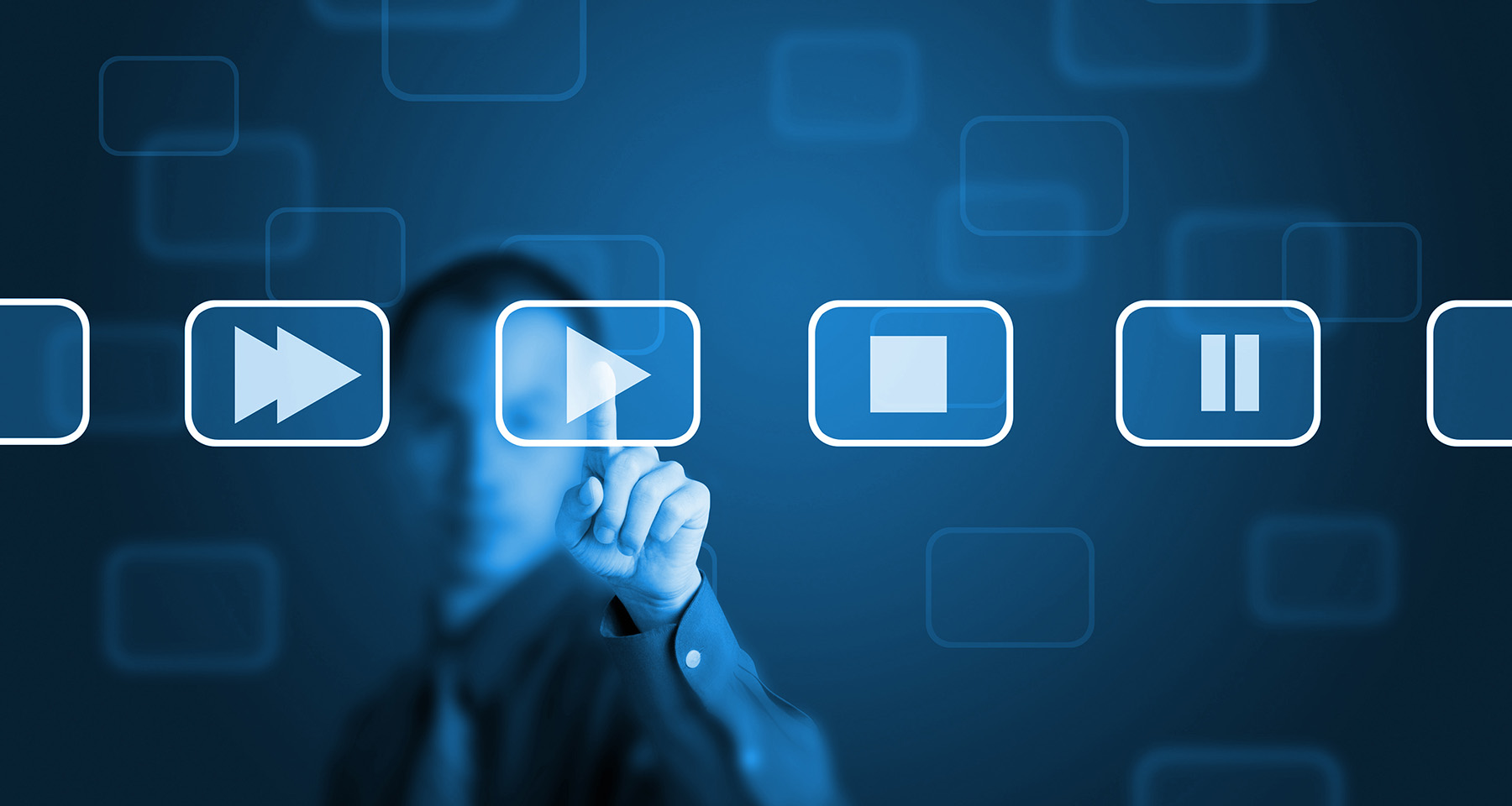New Media, Fall 2019: Difference between revisions
(→Supplementary Documents: Added Google Drive box.) |
m (→Requirements: QEP template.) |
||
| (18 intermediate revisions by the same user not shown) | |||
| Line 2: | Line 2: | ||
{{font|size=18pt|font=Alegreya Sans|text=This online section of New Media examines some social and cultural implications of digital media on human identity and practice. NMAC 4460 is the senior seminar for New Media and Communications majors and should be taken in your final semester.}} | {{font|size=18pt|font=Alegreya Sans|text=This online section of New Media examines some social and cultural implications of digital media on human identity and practice. NMAC 4460 is the senior seminar for New Media and Communications majors and should be taken in your final semester.}} | ||
[[File:20190813-nmac4460-Intro.ogg|thumb|Audio course introduction.]] | |||
This seminar explores our inexorable movement from atoms to bits — from the centralized media landscape of the twentieth century, to that of the current bazaar of networked digital cultures. What does it mean to be citizens of a digital world? Do we invent our technologies, or do they invent us? Welcome to New Media. | |||
<div class="res-img">[[File:New-Media-Keyboard.jpg]]</div> | <div class="res-img">[[File:New-Media-Keyboard.jpg]]</div> | ||
New Media represents a paradigm shift in the ways we produce and consume culture, and these shifts are, in turn, changing us. This course examines the theories of media: from those based on the physical (record players, tape recorders, VCRs, newspapers, books, records) to those based on digital information (computers, VR, DVRs, MP3s, etexts, video-on-demand). Both the theoretical and practical will fall under the purview of this course: not only will we consider the art and business of “new media,” but we will extend our digital fingers and participate in the discussion. | New Media represents a paradigm shift in the ways we produce and consume culture, and these shifts are, in turn, changing us. This course examines the theories of media: from those based on the physical (record players, tape recorders, VCRs, newspapers, books, records) to those based on digital information (computers, VR, DVRs, MP3s, etexts, video-on-demand). Both the theoretical and practical will fall under the purview of this course: not only will we consider the art and business of “new media,” but we will extend our digital fingers and participate in the discussion. | ||
==Introduction== | ==Introduction== | ||
Welcome to NMAC 4460, the Senior Seminar in New Media | Welcome to NMAC 4460, the '''Senior Seminar in New Media'''. | ||
{{Intro}} | |||
{{ | {{Online}} | ||
Again, read this document | Again, read this document carefully before beginning. You might want to take notes as you go, jotting down questions you have. I bet they are answered by the time you’re ready to begin the first lesson. | ||
{{notice|This course does '''not''' use D2L/Brightspace. Everything you need is posted on this site, WikiEdu.org, or Wikipedia. You will sign up for a Wikipedia account and join the class on WikiEdu in your first lesson {{crossreference|(see [[#Schedule|Schedule]])}}.}} | {{notice|This course does '''not''' use D2L/Brightspace. Everything you need is posted on this site, WikiEdu.org, or Wikipedia. You will sign up for a Wikipedia account and join the class on WikiEdu in your first lesson {{crossreference|(see [[#Schedule|Schedule]])}}.}} | ||
| Line 29: | Line 23: | ||
<div class="res-img">[[File:New Media Image 04.jpg]]</div> | <div class="res-img">[[File:New Media Image 04.jpg]]</div> | ||
{{In_Info}} | {{In_Info}} | ||
== | ==Course Information== | ||
{{NMAC 4460}} | |||
{{4460 SLOs}} | |||
== Materials == | == Materials == | ||
===Required Texts=== | ===Required Texts=== | ||
* {{cite book |last=Negroponte |first=Nicholas |date=1996 |title=Being Digital |url=http://amzn.to/2jaaNX5 |location=New York |publisher=Vintage | * {{cite book |last=Negroponte |first=Nicholas |date=1996 |title=Being Digital |url=http://amzn.to/2jaaNX5 |location=New York |publisher=Vintage |page= |ref=harv }}<ref>Buy this book immediately, as you will need it first and use it throughout the semester.</ref> | ||
* [[New Media Suggested Reading and Viewing|Various Links and PDFs]]<ref>[https://drive.google.com/drive/folders/0BxPyGAALGjHqaFVWZGF5U2p5ZjA?usp=sharing Request access].</ref> | * [[New Media Suggested Reading and Viewing|Various Links and PDFs]]<ref>[https://drive.google.com/drive/folders/0BxPyGAALGjHqaFVWZGF5U2p5ZjA?usp=sharing Request access].</ref> | ||
| Line 53: | Line 38: | ||
* {{cite book |last=McLuhan |first=Marshall |date=1964 |title=Understanding Media: the Extensions of Man |url=http://amzn.to/2j02U9v |location=New York |publisher=Routledge |page= }} | * {{cite book |last=McLuhan |first=Marshall |date=1964 |title=Understanding Media: the Extensions of Man |url=http://amzn.to/2j02U9v |location=New York |publisher=Routledge |page= }} | ||
* {{cite book |last=Murray |first=Janet H. |date=1997 |title=Hamlet on the Holodeck: the Future of Narrative in Cyberspace |url=http://amzn.to/2ja0uCz |location=New York |publisher=Simon & Schuster |page= |author-link= }} | * {{cite book |last=Murray |first=Janet H. |date=1997 |title=Hamlet on the Holodeck: the Future of Narrative in Cyberspace |url=http://amzn.to/2ja0uCz |location=New York |publisher=Simon & Schuster |page= |author-link= }} | ||
* {{cite book |last= | * {{cite book |editor1-last=Wardrip-Fruin |editor1-first=Noah |editor2-last=Montfort |editor2-first=Nick |date=2003 |title=The New Media Reader |url=http://amzn.to/2hQD5UT |location=Cambridge |publisher=The MIT Press |page= |ref=harv }} | ||
===Supplementary Documents=== | ===Supplementary Documents=== | ||
| Line 70: | Line 53: | ||
| [[New Media, Fall 2019/R1 Wikipedia Contributions|R1: Wikipedia Contributions]] || 50% | | [[New Media, Fall 2019/R1 Wikipedia Contributions|R1: Wikipedia Contributions]] || 50% | ||
|- | |- | ||
| [[New Media, Fall 2019/R2 | | [[New Media, Fall 2019/R2 Journal|R2: Journal]] || 30% | ||
|- | |- | ||
| [[New Media, Fall 2019/R3 Participation|R3: Participation]] || 20% | | [[New Media, Fall 2019/R3 Participation|R3: Participation]] || 20% | ||
| Line 81: | Line 64: | ||
{{mbox|type=content|text=Students must complete '''all''' assignments in each requirement to successfully pass the course.}} | {{mbox|type=content|text=Students must complete '''all''' assignments in each requirement to successfully pass the course.}} | ||
{{QEP}} | |||
==Policies== | ==Policies== | ||
| Line 96: | Line 81: | ||
{{Technology Online}} | {{Technology Online}} | ||
<div class="res-img">[[File: | <div class="res-img">[[File:High Tech 10.jpg]]</div> | ||
{{Schedule}} | {{Schedule}} | ||
===Course Overview=== | ===Course Overview=== | ||
This course is divided into '''ten lessons'''. The following is just a general outline of the course activities. More details are provided in the tab<ref> | This course is divided into '''ten lessons'''. The following is just a general outline of the course activities. More details are provided in the tab<ref>L1–L10.</ref> for each week located at the top of the page or by clicking the links below. Dues dates for lessons will usually be on '''Sundays at midnight''', but see each lesson for more specifics. | ||
{| class="wikitable" style="width: 100%;" | {| class="wikitable" style="width: 100%;" | ||
|- | |- | ||
| L1 || August 14 – August 23<ref>Note, a portion of this lesson must be completed the first week of class.</ref> || [[New Media, Fall 2019/Lesson 1|Introduction to New Media and Wikipedia]] | | L1 || August 14 – August 23<ref>Note, a portion of this lesson must be completed the first week of class.</ref> || [[New Media, Fall 2019/Lesson 1|Introduction to New Media and Wikipedia]] | ||
|- | |- | ||
| L2 || August 26 – September | | L2 || August 26 – September 6 || [[New Media, Fall 2019/Lesson 2|Foundations]] | ||
|- | |- | ||
| L3 || September 9 – September 13 || [[New Media, Fall 2019/Lesson 3|Being Digital]] | | L3 || September 9 – September 13 || [[New Media, Fall 2019/Lesson 3|Being Digital]] | ||
|- | |- | ||
| L4 || September 16 – September 20 || [[New Media, Fall 2019/Lesson 4| | | L4 || September 16 – September 20 || [[New Media, Fall 2019/Lesson 4|Proprietary v. Open Software]] | ||
|- | |- | ||
| L5 || September 23 – September 27 || [[New Media, Fall 2019/Lesson 5|Remix & Participatory Culture]] | | L5 || September 23 – September 27 || [[New Media, Fall 2019/Lesson 5|Remix & Participatory Culture]] | ||
| Line 117: | Line 101: | ||
| L6 || September 30 – October 4 || [[New Media, Fall 2019/Lesson 6|Hackschooling]] | | L6 || September 30 – October 4 || [[New Media, Fall 2019/Lesson 6|Hackschooling]] | ||
|- | |- | ||
| L7 || October 7 – October 11 || [[New Media, Fall 2019/Lesson 7|Cyberspace]] | | L7 || October 7 – October 11 || [[New Media, Fall 2019/Lesson 7|Cyberspace & VR]] | ||
|- | |- | ||
| L8 || October 14 – October 18 || [[New Media, Fall 2019/Lesson 8| | | L8 || October 14 – October 18 || [[New Media, Fall 2019/Lesson 8|Narratology & Ludology]] | ||
|- | |- | ||
| L9 || October 21 – October 25 || [[New Media, Fall 2019/Lesson 9| | | L9 || October 21 – October 25 || [[New Media, Fall 2019/Lesson 9|Open Week]] | ||
|- | |- | ||
| L10 || October 28 – December 6 || [[New Media, Fall 2019/Lesson 10| | | L10 || October 28 – December 6 || [[New Media, Fall 2019/Lesson 10|Cyborgs and the Technological Singularity; Project Work]] | ||
|} | |} | ||
==Notes== | ==Notes== | ||
{{Reflist}} | {{Reflist|20em}} | ||
[[Category:NMAC 4460]] | [[Category:NMAC 4460]] | ||
[[Category:Online]] | [[Category:Online]] | ||
[[Category:MGA]] | [[Category:MGA]] | ||
Latest revision as of 14:42, 13 August 2019
| 85288 | nmac 4460.01 | Online | Fall, 2019 |
This online section of New Media examines some social and cultural implications of digital media on human identity and practice. NMAC 4460 is the senior seminar for New Media and Communications majors and should be taken in your final semester.
This seminar explores our inexorable movement from atoms to bits — from the centralized media landscape of the twentieth century, to that of the current bazaar of networked digital cultures. What does it mean to be citizens of a digital world? Do we invent our technologies, or do they invent us? Welcome to New Media.
New Media represents a paradigm shift in the ways we produce and consume culture, and these shifts are, in turn, changing us. This course examines the theories of media: from those based on the physical (record players, tape recorders, VCRs, newspapers, books, records) to those based on digital information (computers, VR, DVRs, MP3s, etexts, video-on-demand). Both the theoretical and practical will fall under the purview of this course: not only will we consider the art and business of “new media,” but we will extend our digital fingers and participate in the discussion.
Introduction
Welcome to NMAC 4460, the Senior Seminar in New Media.
The document you’re reading is your syllabus. Everything you need for this class is on this page and linked off of it. The tabs above access the major portions of the syllabus. Bookmark this page now and return here if you get lost or confused.[1] Use the tabs above to navigate to the various sections of the syllabus.[2]
Before you begin, take a moment and familiarize yourself with the general resources I have for students. All of these may be found in the “For Students” menu at the top of the page, or you can just begin on the student start page. These pages are designed to help you succeed in this class. While you may not read everything, you should know what’s available if you need it.
Please read this document and those it links to carefully at the beginning of the semester. There is much information to process, and it can be somewhat daunting — especially if you read cursorily. If you are confused, do your best to work through it by (re)reading this document carefully and completely, searching this site, or consulting the FAQ. I promise, there is an answer to your question. If all else fails, you may contact me. Trust yourself to follow directions and find the answers. Be careful and deliberate.
This online course will probably be unlike any college course you have ever taken. It is designed to let you — the students — discover and create your own knowledge. If you’ve not taken an online course before, you will essentially be teaching yourself with my guidance. I’m assuming, since you’re taking this class online, that you are comfortable with working by yourself, are confident in your ability to take risks and try new approaches, are fine with making some mistakes, do not need the constant reassurance of an authority figure, and have a basic Internet literacy. Please enter with an open mind.
If you are uncomfortable making decisions, researching your own answers, working consistently on your own, making mistakes, teaching yourself, or get frustrated easily, you may be more comfortable in a traditional, face-to-face section of this course. |
Again, read this document carefully before beginning. You might want to take notes as you go, jotting down questions you have. I bet they are answered by the time you’re ready to begin the first lesson.
This course does not use D2L/Brightspace. Everything you need is posted on this site, WikiEdu.org, or Wikipedia. You will sign up for a Wikipedia account and join the class on WikiEdu in your first lesson . |
Instructor Information
| Gerald R. Lucas | |
|---|---|
| Office | CoAS-117 (Macon campus), Department of Media, Culture & the Arts |
| Office Hours | See Contact |
| gerald.lucas [at] mga [dot] edu | |
I try to make myself as available as much as possible during the first couple weeks of a semester, including evenings and weekends. If you need to chat with me, email me and we’ll arrange a video conference via Skype (or similar service), if necessary. Please do not expect a response after 5pm on weekdays or anytime during the weekend. I may be available, but I also need some down time. Thanks for your understanding.
Course Information
| NMAC 4460: Senior Seminar in New Media | |
|---|---|
| Prerequisite | At least a “C” in ENGL 1102 |
| Description | This is a survey of new media theories and praxis. It positions new media in relation to the humanities and traditional media. |
| Classroom Hours | 3 per week. |
| Credits | 3 credits. |
Course Goals
With a successful completion of the NMAC 4460, students will understand:
- the influence of networked digital technologies on communication, art, and culture in a global context;
- the unique properties of new media;
- the historical and cultural contexts of new media from theory to praxis;
- the legal and intellectual property concerns that new media challenges, particularly in the proprietary and open source communities;
- the political responsibilities of new media use;
- the distinction between various theoretical approaches to new media in cultural and academic contexts;
- how new media affects the evolution of the “human.”
Student Learning Outcomes (SLOs)
- Students will demonstrate the ability to analyze and evaluate concepts in new media and communication.
- Students will demonstrate knowledge in new media theory.
- Students will demonstrate skills in research and writing.
Materials
Required Texts
- Negroponte, Nicholas (1996). Being Digital. New York: Vintage.[3]
- Various Links and PDFs[4]
Recommended Texts
- Kurzweil, Ray (1999). The Age of Spiritual Machines: When Computers Exceed Human Intelligence. New York: Viking Penguin.
- Lessig, Lawrence (2008). Remix: Making Art and Commerce Thrive in the Hybrid Economy. New York: Penguin.
- McLuhan, Marshall (1964). Understanding Media: the Extensions of Man. New York: Routledge.
- Murray, Janet H. (1997). Hamlet on the Holodeck: the Future of Narrative in Cyberspace. New York: Simon & Schuster.
- Wardrip-Fruin, Noah; Montfort, Nick, eds. (2003). The New Media Reader. Cambridge: The MIT Press.
Supplementary Documents
At several points throughout the semester, your reading assignments will entail essays that are not in the above texts. These additional readings will be made available to you as PDFs via Google Drive: request access. You will need to download them, print them (or put them on your device), and bring them on the day we are covering them in class. Failure to do so will earn you an absence.
Requirements
| Requirement | % |
|---|---|
| R1: Wikipedia Contributions | 50% |
| R2: Journal | 30% |
| R3: Participation | 20% |
This course is composed of three components, listed in the chart on the right. Each is detailed in the tabs[5] at the top of the page or by following the links. Each requirement will be on-going throughout the semester, will require regular contributions, and be comprised of various assignments.
Projects you complete online should be able to stand alone; that is, assignments should not reference the class, but target a particular professional audience. Remember, these are public documents, not just assignments; your audience, if you’re considering yourself as part of an expert community, is not necessarily your classmates and professor.
Please read each project at the beginning of the semester, so you have an understanding of what will be expected of you during the semester. Some assignments will take longer to complete than others. Work a bit and practice every day — do not procrastinate.[6]
Students must complete all assignments in each requirement to successfully pass the course. |
QEP for Undergraduate Research
This course allows students to participate the undergraduate research portion of the Experiential Learning@MGA program.[7] This program involves students in applications of learning beyond the classroom. It will be accomplished through the course research component and the submission of a research journal [8] at the end of the class. By completing the requirements of this course successfully, students will get credit for experiential learning.
Policies
Students are held accountable for knowing and practicing each of the following course policies. Consider them like the law: the excuse “I didn’t know” will carry no weight. In addition, students are responsible for reading, understanding, and adhering to all Middle Georgia State University student policies, including those linked on the Syllabus Policy page.[9]
Students may withdraw from the course and earn a grade of “W” up to and including the midterm date. After midterm, students who withdraw will receive a grade of “WF.” Students are encouraged to read the withdrawal policy before dropping/withdrawing from class.
Assignments and Deadlines
Your work represents you. Everything you turn in for evaluation should exemplify the very best of your professional self. Late work is unacceptable and will receive a zero. Technical problems do not excuse late work. Plan ahead and turn in your work on time. Last-minute work submissions are ineligible for revision for a higher grade.
Attendance
Attendance for online courses is based on consistent participation. While students may work within lessons at their own pace, there will be assignments and milestones due regularly, usually each week. In other words: students are required to submit work each week to remain in good-standing. I recommend working a bit every day for consistency and to facilitate learning. Any registered student who does not submit work the first week will be counted as a no-show. Large gaps in participation (more than a week of not working) will be grounds for failure.
Communication
Communication is integral to success, no matter what we’re talking about. In a digital world, these literacies are particularly important. Not only should you develop and perfect your communication skills while in college, you need to use those skills everyday with your peers and professors.
Evaluation
Evaluation depends on overall student performance: on the successful completion of all requirements, regular participation, and positive attitude. Some requirements are weighed heavier in evaluation, but all are essential to successfully complete the class. Letter grades are based upon a traditional ten-point scale. Grades for this class will be based on the point system.
Plagiarism
Plagiarism is serious academic misconduct. Willful or accidental plagiarism—including using AI tools to generate assignments—will result in assignment failures, potential class failure, and will be pursued to incite the utmost penalty for such dishonesty.
Research
All writing in this course should be supported with both primary (readings I assign you) and secondary (sources you find yourself) texts. All suppositions must be supported with evidence, whether they appear on a forum post, a blog post, a Wikipedia article, or class discussion. In other words: research is an integral component of everything you do in this course. Any ideas that are not supported might as well not be written.
Technology Requirements
All students should have a newish computer with dependable Internet access. A tablet for reading PDFs is convenient, but not a requirement of the course. Students should check the course site daily for updates. Students are responsible for working out all of their technical difficulties.
Schedule
This schedule represents the ideal outline for our study this semester. Yet, like all best-laid plans, we may not be able to keep up with our agenda. Please be flexible and try to look and read ahead whenever possible. We will do our best to stick by this schedule, but I will inform you verbally whenever there is a change in or an addition to an assignment. Getting these updates is solely your responsibility. Therefore, this schedule is tentative and subject to change contingent upon the needs of the students and the professor, and dictated by time and other constraints which may affect the course. This schedule reflects only an overview of the assigned reading and other major course assignments. It may not indicate specific class session assignments or activities. Specific assignments are often given in class.
Course Overview
This course is divided into ten lessons. The following is just a general outline of the course activities. More details are provided in the tab[10] for each week located at the top of the page or by clicking the links below. Dues dates for lessons will usually be on Sundays at midnight, but see each lesson for more specifics.
| L1 | August 14 – August 23[11] | Introduction to New Media and Wikipedia |
| L2 | August 26 – September 6 | Foundations |
| L3 | September 9 – September 13 | Being Digital |
| L4 | September 16 – September 20 | Proprietary v. Open Software |
| L5 | September 23 – September 27 | Remix & Participatory Culture |
| L6 | September 30 – October 4 | Hackschooling |
| L7 | October 7 – October 11 | Cyberspace & VR |
| L8 | October 14 – October 18 | Narratology & Ludology |
| L9 | October 21 – October 25 | Open Week |
| L10 | October 28 – December 6 | Cyborgs and the Technological Singularity; Project Work |
Notes
- ↑ While you may certainly choose to print it—we will do our best to follow the schedule hereon—it may change during the course of the semester due to unforeseen circumstances. Should this occur, I will let you know, but ultimately, this online document has the final say—not a printed one.
- ↑ You might, too, follow links by opening them in browser tabs—click the link by holding the ⌘ Command on a Mac or Ctrl on a PC—so you can easily return to where you left off.
- ↑ Buy this book immediately, as you will need it first and use it throughout the semester.
- ↑ Request access.
- ↑ Denoted as R1—R3.
- ↑ Seriously, procrastination is likely the cause of 95% of failures in this course. You must work consistently and carefully each week to be successful.
- ↑ "Experiential Learning@MGA". MGA. 2018. Retrieved 2019-01-06.
- ↑ This includes a student self-assessment form and an instructor assessment.
- ↑ See the MGA website's Syllabus Policy Page the policies linked thereon.
- ↑ L1–L10.
- ↑ Note, a portion of this lesson must be completed the first week of class.



